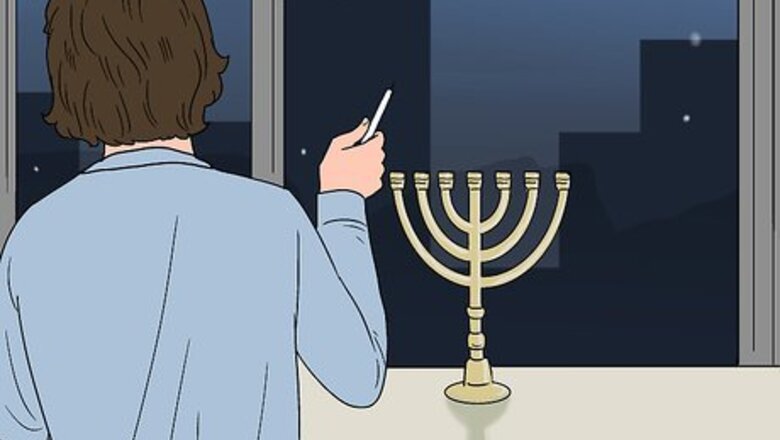
views
X
Trustworthy Source
Chabad.org
Online resource for information related to Chabad-Lubavitch and Jewish culture
Go to source
Lighting the Menorah
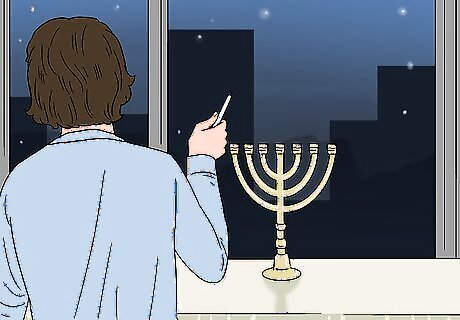
Begin lighting the menorah at sunset or nightfall. Avoid lighting your menorah during the day since it’s not per tradition. Instead, wait until sunset on the first evening of Hanukkah, which is the 24th day of the month Kislev on the Jewish calendar. Wait until the sun starts setting or until after nightfall, which is typically 20–30 minutes after sunset, to light your menorah. Wait until your family members are home to light your menorah so you can all celebrate together. You can light your menorah any time after sunset but no later than a half-hour before dawn. Hanukkah 2023 lasts from the evening of Thursday the 7th of December to the evening of Friday the 15th of December.
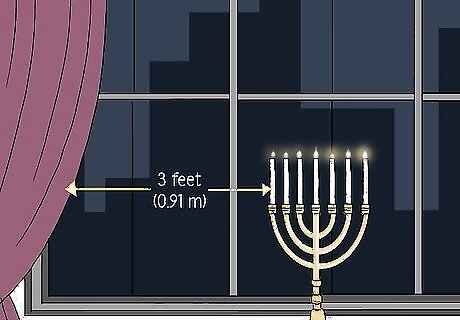
Place your menorah near a doorway or in front of a window. If you have the mezuzah, a scroll with portions of the Shema, on a doorpost, then set your menorah on a small table or chair near the opposite side of the doorway. Keep your menorah on a metal or ceramic tray to protect your table. Otherwise, you can set your menorah in a windowsill facing the street so others can see the lights at night. Be careful not to put your menorah within 3 feet (0.91 m) of curtains or other flammable material.Variation: If you live in a dorm or apartment and aren’t allowed to light candles, reach out to your resident advisor or landlord to see if they’ll make an exception for you. Otherwise, you may need to talk to a rabbi to find out an acceptable place to kindle your menorah.
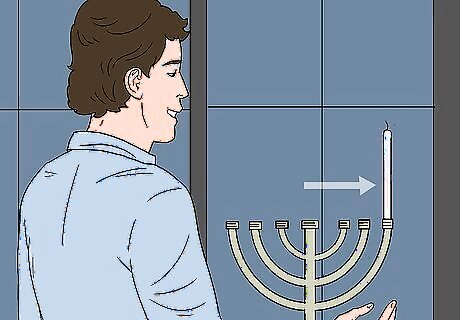
Set your first candle in the far right space. You can place the candle in your menorah at any time during the day, but wait until the evening to light it. Choose a candle that’s large enough to burn for at least 30 minutes after nightfall. On the first night of Hanukkah, take one of your candles and place it in the rightmost slot on your menorah. Don’t fill any of the other slots yet since you’ll add more candles later on. You can buy candles specifically made for menorahs and Hanukkah online or in big box stores. Standard menorah candles usually burn for 30 minutes. You can also use oil lamps instead of candles. While electric menorahs make great decorations around your home, it’s tradition to light a candle or oil lamp menorah during Hanukkah.
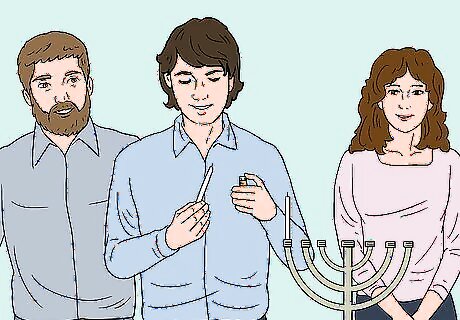
Light the shamash candle. The shamash candle, also known as the “servant” candle, is separate from the other Hanukkah candles and used to kindle the others. Wait until you and everyone in your home are gathered around the menorah. Use a lighter or match to start the shamash candle and hold it in your dominant hand. Always light the other candles on your menorah with the shamash candle rather than using a match or lighter.
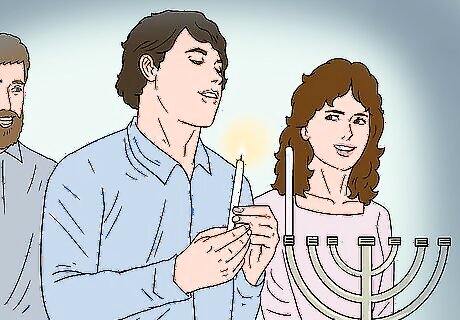
Recite the menorah blessings. While the shamash candle burns, stand next to your menorah and say the blessings out loud. You only need to recite the blessings if you’re the one lighting the menorah. On the first night, there are 3 blessings you’ll say to thank God for the Hanukkah miracles. On each of the remaining nights of Hanukkah, you only need to recite the first 2 blessings. The first blessing is: Baruch atah, Adonai Eloheinu, Melech haolam, asher kid’shanu b’mitzvotav v’tsivanu l’hadlik ner shel Hanukkah. (Blessed are You, Lord our God, King of the universe, who has sanctified us with His commandments, and commanded us to kindle the Hanukkah light.) The second blessing is: Baruch atah, Adonai Eloheinu, Melech haolam, she-asah nisim la’avoteinu bayamim hahem bazman hazeh. (Blessed are You, Lord our God, King of the universe, who performed miracles for our forefathers in those days, at this time.) The third blessing is: Baruch atah adonai elohenu melech ha’olam, shehecheyanu, v’kiyimanu, v’higiyanu lazman hazeh. (Blessed are You, Lord our G‑d, King of the universe, who has granted us life, sustained us, and enabled us to reach this occasion.)
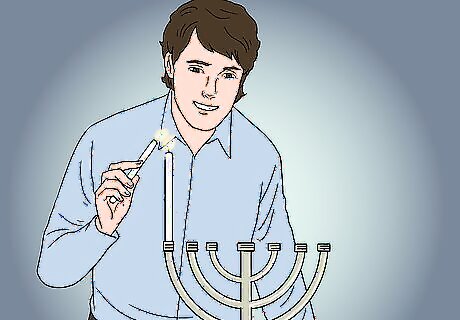
Use the shamash candle to light the other candle. Once you recite all of the blessings, hold the flame of your shamash candle against the wick of the candle in your menorah. Wait until the wick catches on fire before pulling the shamash candle away. Set the shamash candle in the slot on your menorah that’s raised or in a different row than the Hanukkah candle. Keep the shamash candle lit since you may use it to relight the Hanukkah candle if it goes out.
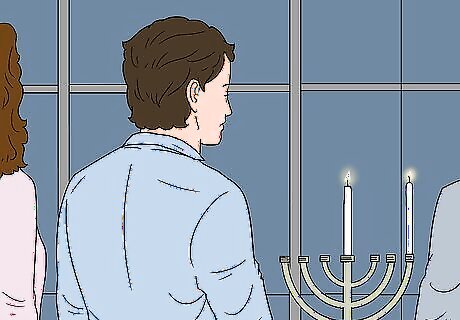
Sing or recite the Hanerot Halalu hymn. The Hanerot Halalu hymn praises God for the Hanukkah miracles and it’s a tradition for you to say it each night. If you’re the one lighting the menorah, then you’ll recite the hymn in Hebrew. Say or sing the following: Hanerot halalu anachnu madlikin, Al hanissim ve'al haniflaot, Al hatshu-ot ve'al hamilchamot, She-asita la'avoteynu, Bayamim hahem, bazman hazeh, Al yedey kohanecha hak'doshim. Vechol shmonat yemey Chanukah, Hanerot halalu kodesh hem, Ve-ein lanu reshut lehishtamesh bahem, Ela lirotam bilvad, Kedai lehodot lihalel, Al nissecha veal nifleotecha, ve-al yeshuotecha. When you translate the Hebrew into English, it reads, “We kindle these lights to commemorate the saving acts, miracles and wonders which You have performed for our forefathers, in those days at this time, through Your holy priests. Throughout the eight days of Chanukah, these lights are sacred, and we are not permitted to make use of them, but only to look at them, in order to offer thanks and praise to Your great Name for Your miracles, for Your wonders and for Your salvations.”
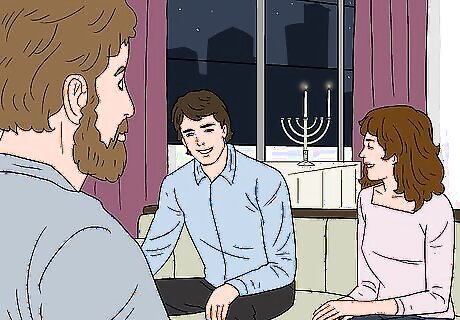
Allow the candle to burn for at least 30 minutes after nightfall. While the candle burns, just relax with the members of your household and avoid doing any work. Leave the candles alone while they burn so they don’t accidentally go out. If the candle extinguishes and it hasn’t been 30 minutes since nightfall, relight it with your shamash candle. If the candle goes out afterward, you do not have to relight it and can throw it away. You will put new candles in your menorah every day during Hanukkah.
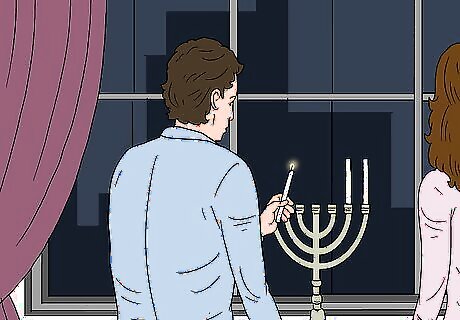
Add another candle in the next rightmost slot each day. On the second day of Hanukkah, place another candle in the first slot on the right. Then put a second candle in the slot immediately to the left of it. When you light your menorah, start with the candle that’s furthest to the left and work toward the right side. On the following days, add 1 additional candle to the menorah. On the 8th day of Hanukkah, you’ll fill every slot in the menorah. Remember to recite the first 2 blessings each night of Hanukkah. Always use a new shamash candle when you light your menorah.
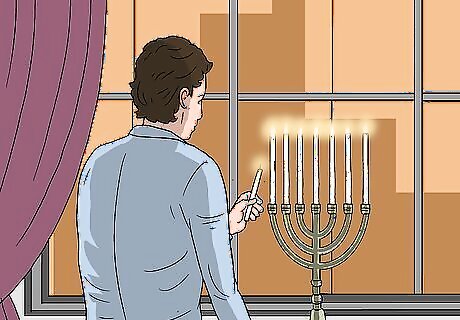
Start lighting your menorah before sunset on the Friday before Shabbat. Shabbat is the day of rest and it’s forbidden to light a fire after sunset on Friday through nightfall on Saturday. On Shabbat, you also need to light specific Shabbat candles 18 minutes before sunset. Start lighting your menorah before the Shabbat candles on Friday while the sun is still out. Use larger candles since standard Hanukkah candles won’t stay lit 30 minutes after nightfall. If a candle on your menorah goes out after sunset, don’t relight it. On Saturday, wait to light your menorah until nightfall so you don’t start a flame on Shabbat.
Observing Hanukkah Traditions
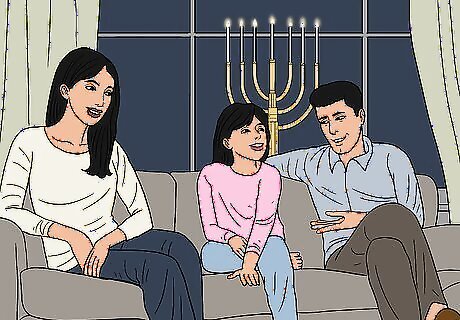
Tell Hanukkah stories when you sit by the menorah. As you relax with your family around the menorah, you can share the story of how Hanukkah started to explain the holiday to children. You can also share personal stories or experiences you’ve had with family and friends during Hanukkah. While you don’t have to tell stories each night of Hanukkah, it can be a great time to bond with others.
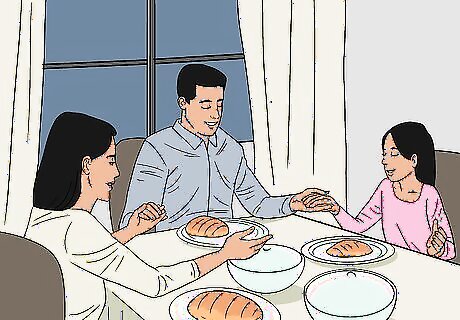
Recite the Al Hanisim liturgy during daily prayers and grace after meals. Whenever you do your silent daily prayers or say grace after a meal, say, “Al hanissim, v’al hapurkan, v’al hag’vurot v’al hat’tshuot v’al hamilchamot sh’asita lavoteinu bayamim hahem baz’man hazeh.” This translates to, “We thank thee also for the miracles, for the redemption, for the mighty deeds and saving acts, wrought by thee, as well as for the wars which thou didst wage for our fathers in days of old, at this season.” The Al Hanisim prayer is used to give thanks to God for his miracles.
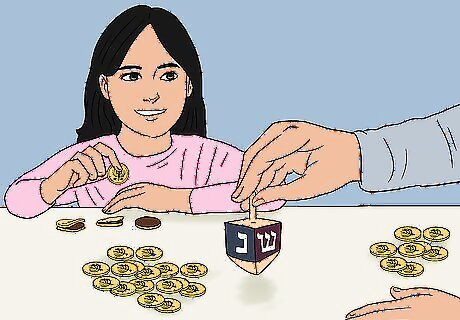
Spin a dreidel if you want to play a fun game. Gather as many players as you want and give everyone equal numbers of game pieces, such as chocolates, pennies, candies, or nuts. At the start of the round, have everyone put one of their items in the middle to form the pot. Take turns spinning the dreidel and wait until it falls over. Read the symbol on the face-up side and do the following: If you spin nun, then you don’t take anything from the pot. If the dreidel lands on gimel, then you get everything in the pot. If you get hey, then you take half of the pieces from the pot. When you land on shin, then you need to add a piece to the pot. If you run out of pieces, then you’re out of the game. The person who ends the game with all of the pieces is the winner!
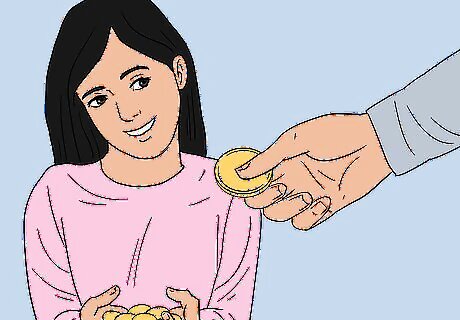
Give small gifts to children each weeknight. After lighting the menorah, hand out gelt, or small gifts, to any children in your household. You can give things like candies, treats, or small amounts of money for a festive surprise. When you give the children gelt, encourage them to share or donate a small portion of it so they learn more about charity. Hand out a larger amount on the fourth or fifth night of Hanukkah since it’s tradition.
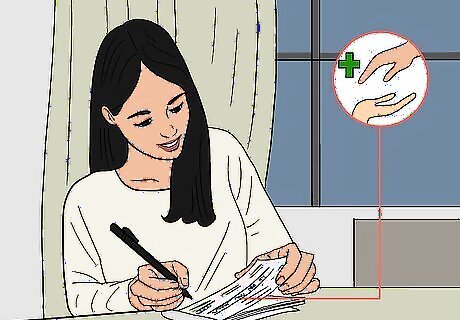
Donate extra to charity if you’re able to. If you already give money, give out a little extra each day during Hanukkah to show your appreciation and to spread charity. On the Friday during Hanukkah, give double the amount you normally would since you won’t be able to donate anything on Saturday since it’s Shabbat, or the day of rest. It’s okay not to give more if you’re not financially able to.
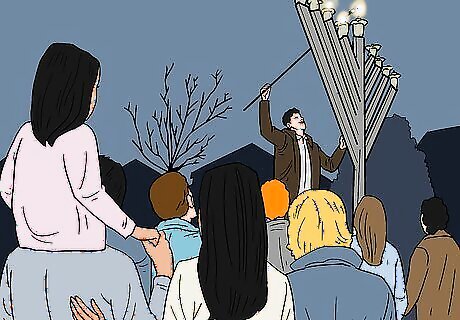
Attend a public menorah lighting if you want to spend time with others. Look online or at community event pages for Hanukkah celebrations to see if they have any public lighting events. Usually, they will light a giant menorah so it’s easy for everyone to see. After the lighting, recite blessings, sing hymns, and enjoy food with one another to spread the holiday cheer. You can find a list of Hanukkah events here: https://www.chabad.org/holidays/chanukah/Lighting_listing_cdo/aid/103839/jewish/Chanukah-Event-Directory.htm.Tip: Even though you’ve attended a public menorah lighting, you still need to light the one you have at home.
Serving Hanukkah Food
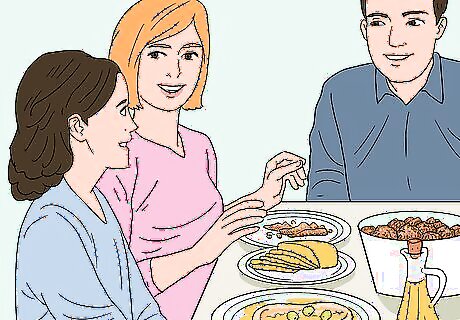
Incorporate more oil and dairy into your meals. In the story of Hanukkah, the Maccabees found a small jug of olive oil that miraculously lasted 8 nights after taking back a temple. To honor the miracle, cook and fry foods in oil throughout Hanukkah. Dairy also honors Judith, who saved her village from Syrians with an offering of wine and cheese, so enjoy more foods with milk, cream, and cheese in remembrance of the holiday. Any oil will work for cooking and frying.
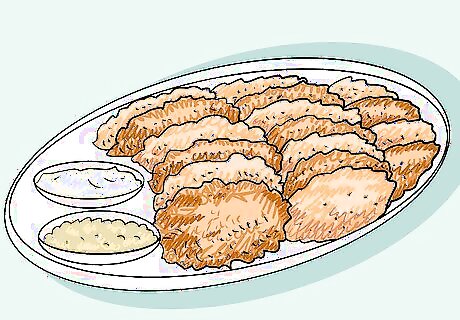
Fry latkes in oil for a traditional Jewish meal. Latkes are traditionally potato pancakes, but you can make them with carrots, zucchini, or anything else that fries easily. Finely grate 5 potatoes and 1 onion, and strain out any excess water. Combine the potato mixture with 3 eggs, ⅓ cup (43 g) of flour, 1 tsp (6 g) of salt, and ¼ tsp (0.6 g) of pepper. Heat ⁄2 cup (120 ml) of oil in a skillet and pour some of the mixture into the pan. Cook each side of your latke for 5 minutes or until it’s golden brown. This recipe makes 4–6 servings. Top your latkes with sour cream or cheese to incorporate dairy into your meal as well.
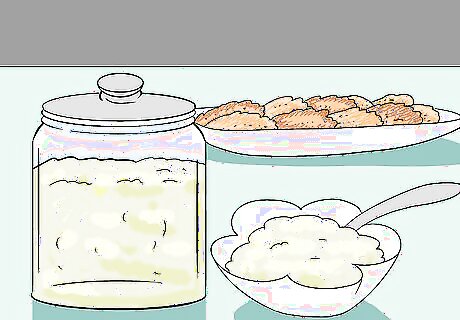
Enjoy applesauce with fresh latkes for a sweet and salty dish. You can either buy applesauce from the store or make your own. Try using different varieties of apples to make the applesauce sweeter or more tart. When you eat your latkes, dip them in the applesauce to combine the flavors. You can make applesauce earlier in the year and preserve it in jars until Hanukkah.
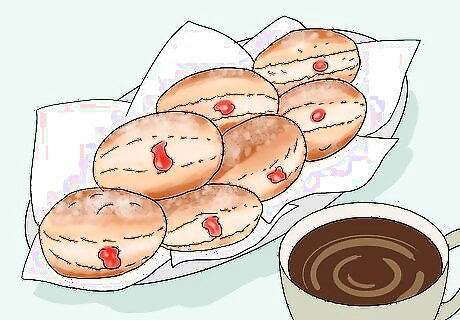
Make jam-filled doughnuts covered in powdered sugar for a sweet treat. Jelly doughnuts, or sufganiyot, are traditional sweets fried in oil and stuffed with any jam of your choice. Start by making a dough with milk, sugar, flour, eggs, butter, and yeast, and kneading it until it’s smooth. Let the dough rise for 2 hours before rolling it out so it’s ⁄2 in (1.3 cm) thick. Cut out 3–4 in (7.6–10.2 cm) rounds and let them rise until they double in size. Then fry each doughnut for 1–2 minutes per side. Use an icing bag or squeeze bottle to put the jelly inside of the doughnut once they’re cool. Coat the doughnuts with powdered sugar or cinnamon for additional sweet flavors.
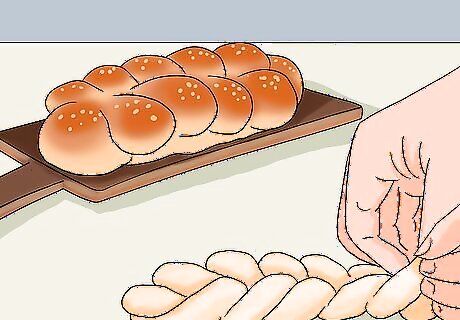
Bake challah if you want a delicious bread. Challah is a braided bread that doesn’t contain any butter or milk. Make your bread dough with yeast, flour, sugar, salt, eggs, and oil and knead until it’s thoroughly combined. Let the dough rise until it’s doubled in size before cutting it into 3–6 equal rope-shaped pieces. Braid the pieces together and let it rise for an hour. Brush the dough with egg whites before cooking it in your oven. You can add honey or dried fruit if you want your bread to have a sweeter flavor.











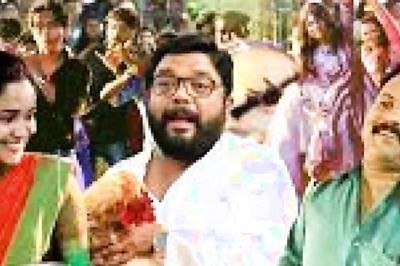



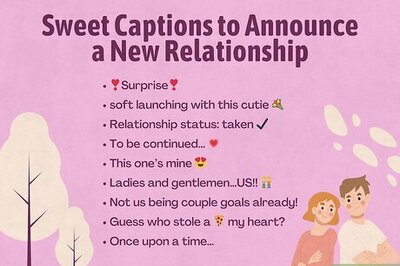
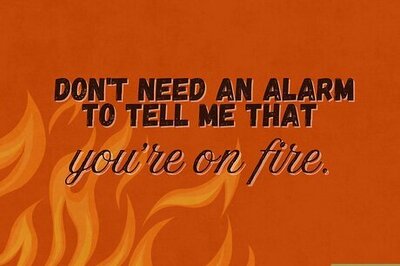
Comments
0 comment